Financial Reporting and its Impact on Stakeholders and Frameworks
VerifiedAdded on 2021/02/21
|9
|1957
|54
Report
AI Summary
This report provides a detailed analysis of financial reporting, focusing on the conceptual and regulatory frameworks that govern the preparation and presentation of financial statements. It explores the purpose and key principles of these frameworks, emphasizing their importance in ensuring the reliability and consistency of financial information. The report also identifies the main stakeholders of a business organization, including shareholders, creditors, directors, employees, and the government, and examines the specific benefits each group derives from financial information. Furthermore, it highlights the qualitative characteristics that enhance the usefulness of financial information, such as comparability, verifiability, timeliness, and understandability. The report uses PWC as a case study to illustrate the practical application of these concepts, concluding that effective financial reporting is crucial for organizational success and stakeholder confidence.
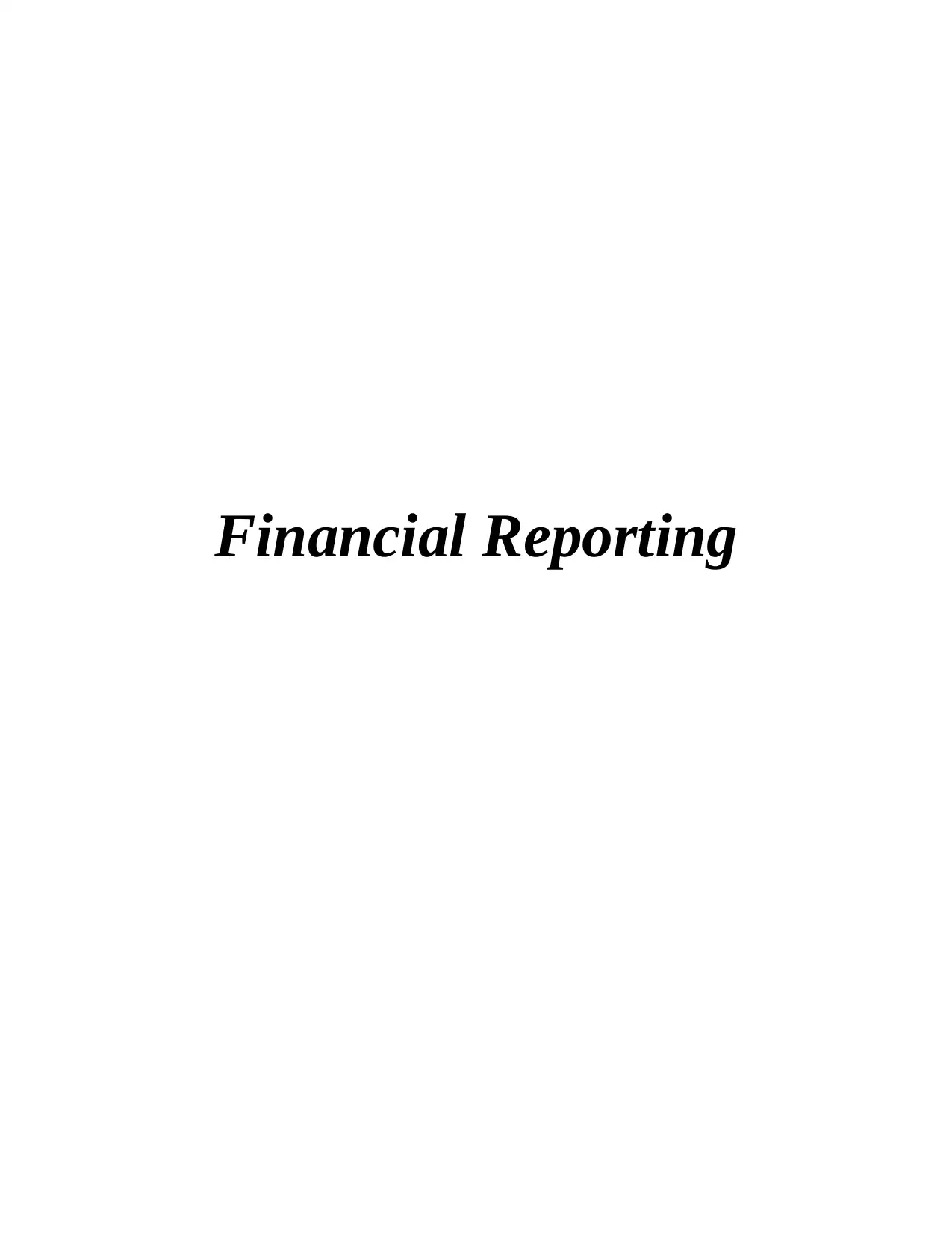
Financial Reporting
Paraphrase This Document
Need a fresh take? Get an instant paraphrase of this document with our AI Paraphraser
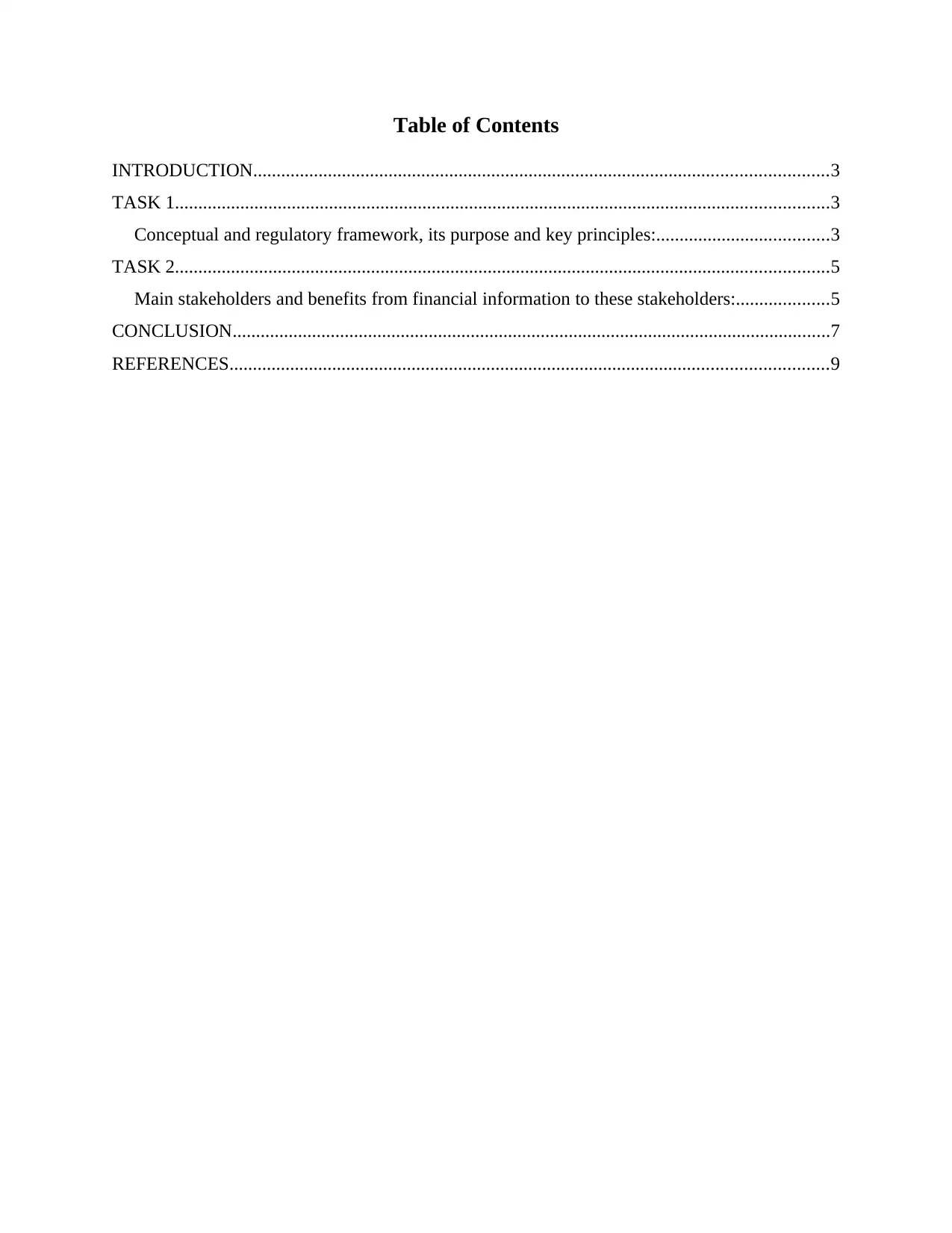
Table of Contents
INTRODUCTION...........................................................................................................................3
TASK 1............................................................................................................................................3
Conceptual and regulatory framework, its purpose and key principles:.....................................3
TASK 2............................................................................................................................................5
Main stakeholders and benefits from financial information to these stakeholders:....................5
CONCLUSION................................................................................................................................7
REFERENCES................................................................................................................................9
INTRODUCTION...........................................................................................................................3
TASK 1............................................................................................................................................3
Conceptual and regulatory framework, its purpose and key principles:.....................................3
TASK 2............................................................................................................................................5
Main stakeholders and benefits from financial information to these stakeholders:....................5
CONCLUSION................................................................................................................................7
REFERENCES................................................................................................................................9
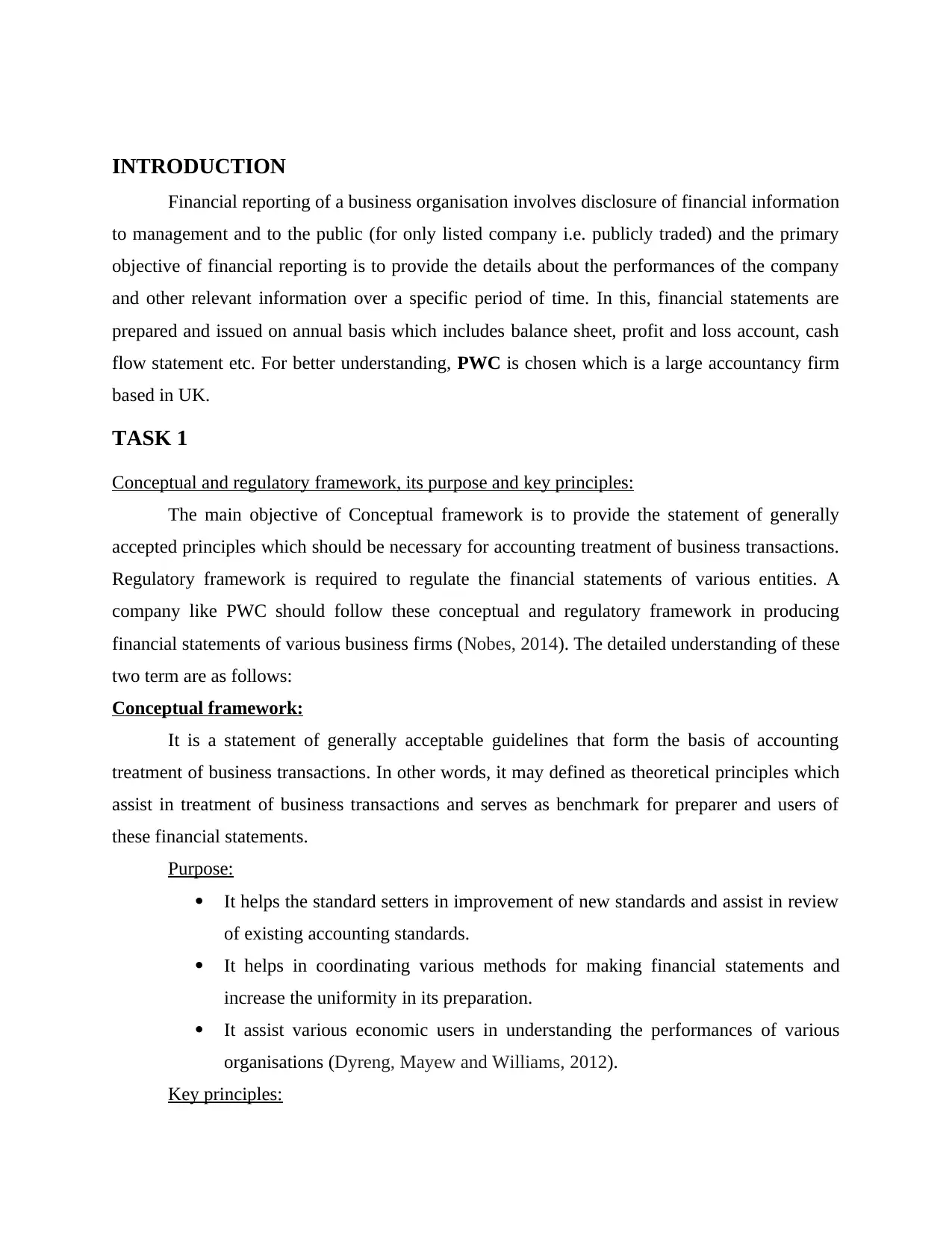
INTRODUCTION
Financial reporting of a business organisation involves disclosure of financial information
to management and to the public (for only listed company i.e. publicly traded) and the primary
objective of financial reporting is to provide the details about the performances of the company
and other relevant information over a specific period of time. In this, financial statements are
prepared and issued on annual basis which includes balance sheet, profit and loss account, cash
flow statement etc. For better understanding, PWC is chosen which is a large accountancy firm
based in UK.
TASK 1
Conceptual and regulatory framework, its purpose and key principles:
The main objective of Conceptual framework is to provide the statement of generally
accepted principles which should be necessary for accounting treatment of business transactions.
Regulatory framework is required to regulate the financial statements of various entities. A
company like PWC should follow these conceptual and regulatory framework in producing
financial statements of various business firms (Nobes, 2014). The detailed understanding of these
two term are as follows:
Conceptual framework:
It is a statement of generally acceptable guidelines that form the basis of accounting
treatment of business transactions. In other words, it may defined as theoretical principles which
assist in treatment of business transactions and serves as benchmark for preparer and users of
these financial statements.
Purpose:
It helps the standard setters in improvement of new standards and assist in review
of existing accounting standards.
It helps in coordinating various methods for making financial statements and
increase the uniformity in its preparation.
It assist various economic users in understanding the performances of various
organisations (Dyreng, Mayew and Williams, 2012).
Key principles:
Financial reporting of a business organisation involves disclosure of financial information
to management and to the public (for only listed company i.e. publicly traded) and the primary
objective of financial reporting is to provide the details about the performances of the company
and other relevant information over a specific period of time. In this, financial statements are
prepared and issued on annual basis which includes balance sheet, profit and loss account, cash
flow statement etc. For better understanding, PWC is chosen which is a large accountancy firm
based in UK.
TASK 1
Conceptual and regulatory framework, its purpose and key principles:
The main objective of Conceptual framework is to provide the statement of generally
accepted principles which should be necessary for accounting treatment of business transactions.
Regulatory framework is required to regulate the financial statements of various entities. A
company like PWC should follow these conceptual and regulatory framework in producing
financial statements of various business firms (Nobes, 2014). The detailed understanding of these
two term are as follows:
Conceptual framework:
It is a statement of generally acceptable guidelines that form the basis of accounting
treatment of business transactions. In other words, it may defined as theoretical principles which
assist in treatment of business transactions and serves as benchmark for preparer and users of
these financial statements.
Purpose:
It helps the standard setters in improvement of new standards and assist in review
of existing accounting standards.
It helps in coordinating various methods for making financial statements and
increase the uniformity in its preparation.
It assist various economic users in understanding the performances of various
organisations (Dyreng, Mayew and Williams, 2012).
Key principles:
⊘ This is a preview!⊘
Do you want full access?
Subscribe today to unlock all pages.

Trusted by 1+ million students worldwide
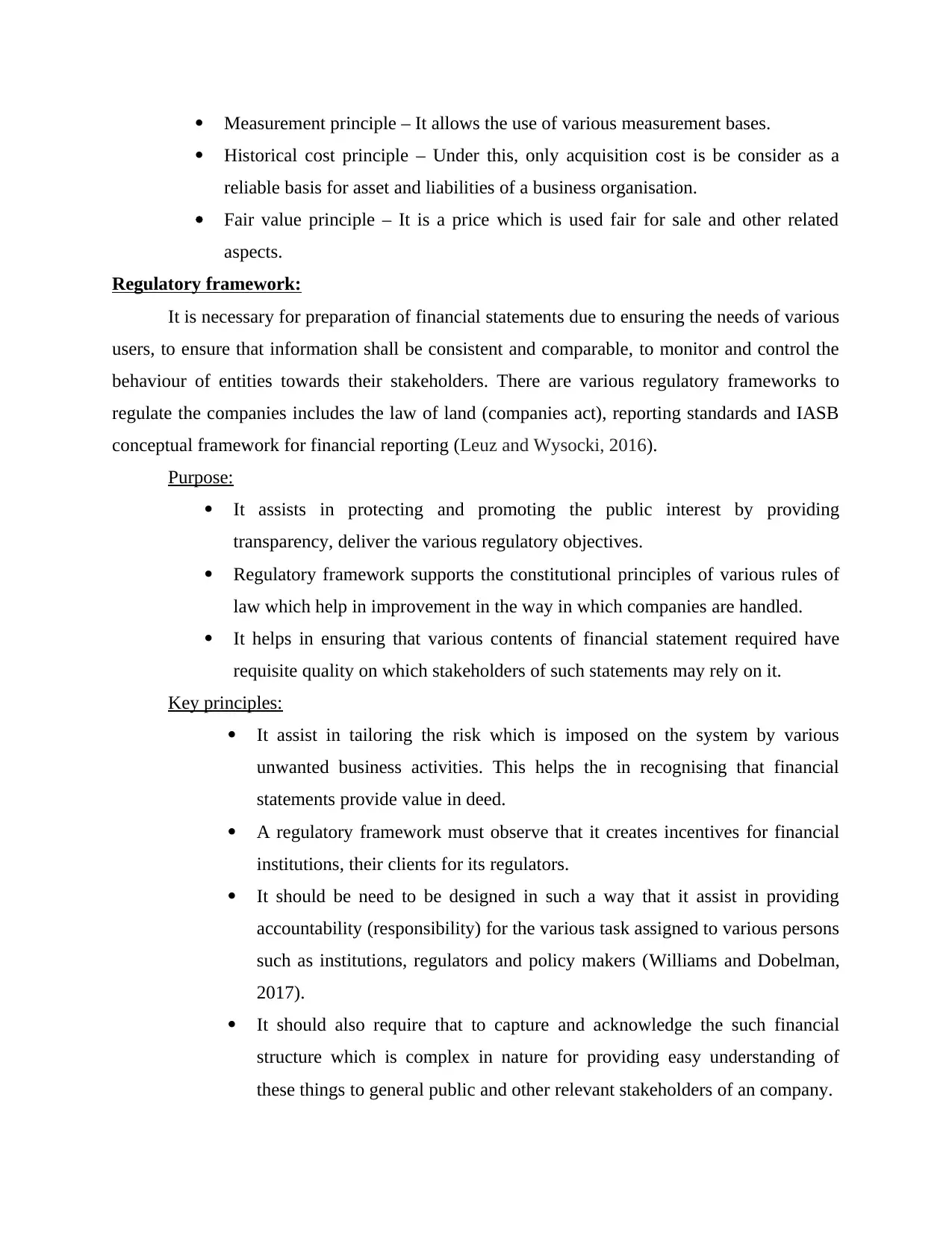
Measurement principle – It allows the use of various measurement bases.
Historical cost principle – Under this, only acquisition cost is be consider as a
reliable basis for asset and liabilities of a business organisation.
Fair value principle – It is a price which is used fair for sale and other related
aspects.
Regulatory framework:
It is necessary for preparation of financial statements due to ensuring the needs of various
users, to ensure that information shall be consistent and comparable, to monitor and control the
behaviour of entities towards their stakeholders. There are various regulatory frameworks to
regulate the companies includes the law of land (companies act), reporting standards and IASB
conceptual framework for financial reporting (Leuz and Wysocki, 2016).
Purpose:
It assists in protecting and promoting the public interest by providing
transparency, deliver the various regulatory objectives.
Regulatory framework supports the constitutional principles of various rules of
law which help in improvement in the way in which companies are handled.
It helps in ensuring that various contents of financial statement required have
requisite quality on which stakeholders of such statements may rely on it.
Key principles:
It assist in tailoring the risk which is imposed on the system by various
unwanted business activities. This helps the in recognising that financial
statements provide value in deed.
A regulatory framework must observe that it creates incentives for financial
institutions, their clients for its regulators.
It should be need to be designed in such a way that it assist in providing
accountability (responsibility) for the various task assigned to various persons
such as institutions, regulators and policy makers (Williams and Dobelman,
2017).
It should also require that to capture and acknowledge the such financial
structure which is complex in nature for providing easy understanding of
these things to general public and other relevant stakeholders of an company.
Historical cost principle – Under this, only acquisition cost is be consider as a
reliable basis for asset and liabilities of a business organisation.
Fair value principle – It is a price which is used fair for sale and other related
aspects.
Regulatory framework:
It is necessary for preparation of financial statements due to ensuring the needs of various
users, to ensure that information shall be consistent and comparable, to monitor and control the
behaviour of entities towards their stakeholders. There are various regulatory frameworks to
regulate the companies includes the law of land (companies act), reporting standards and IASB
conceptual framework for financial reporting (Leuz and Wysocki, 2016).
Purpose:
It assists in protecting and promoting the public interest by providing
transparency, deliver the various regulatory objectives.
Regulatory framework supports the constitutional principles of various rules of
law which help in improvement in the way in which companies are handled.
It helps in ensuring that various contents of financial statement required have
requisite quality on which stakeholders of such statements may rely on it.
Key principles:
It assist in tailoring the risk which is imposed on the system by various
unwanted business activities. This helps the in recognising that financial
statements provide value in deed.
A regulatory framework must observe that it creates incentives for financial
institutions, their clients for its regulators.
It should be need to be designed in such a way that it assist in providing
accountability (responsibility) for the various task assigned to various persons
such as institutions, regulators and policy makers (Williams and Dobelman,
2017).
It should also require that to capture and acknowledge the such financial
structure which is complex in nature for providing easy understanding of
these things to general public and other relevant stakeholders of an company.
Paraphrase This Document
Need a fresh take? Get an instant paraphrase of this document with our AI Paraphraser
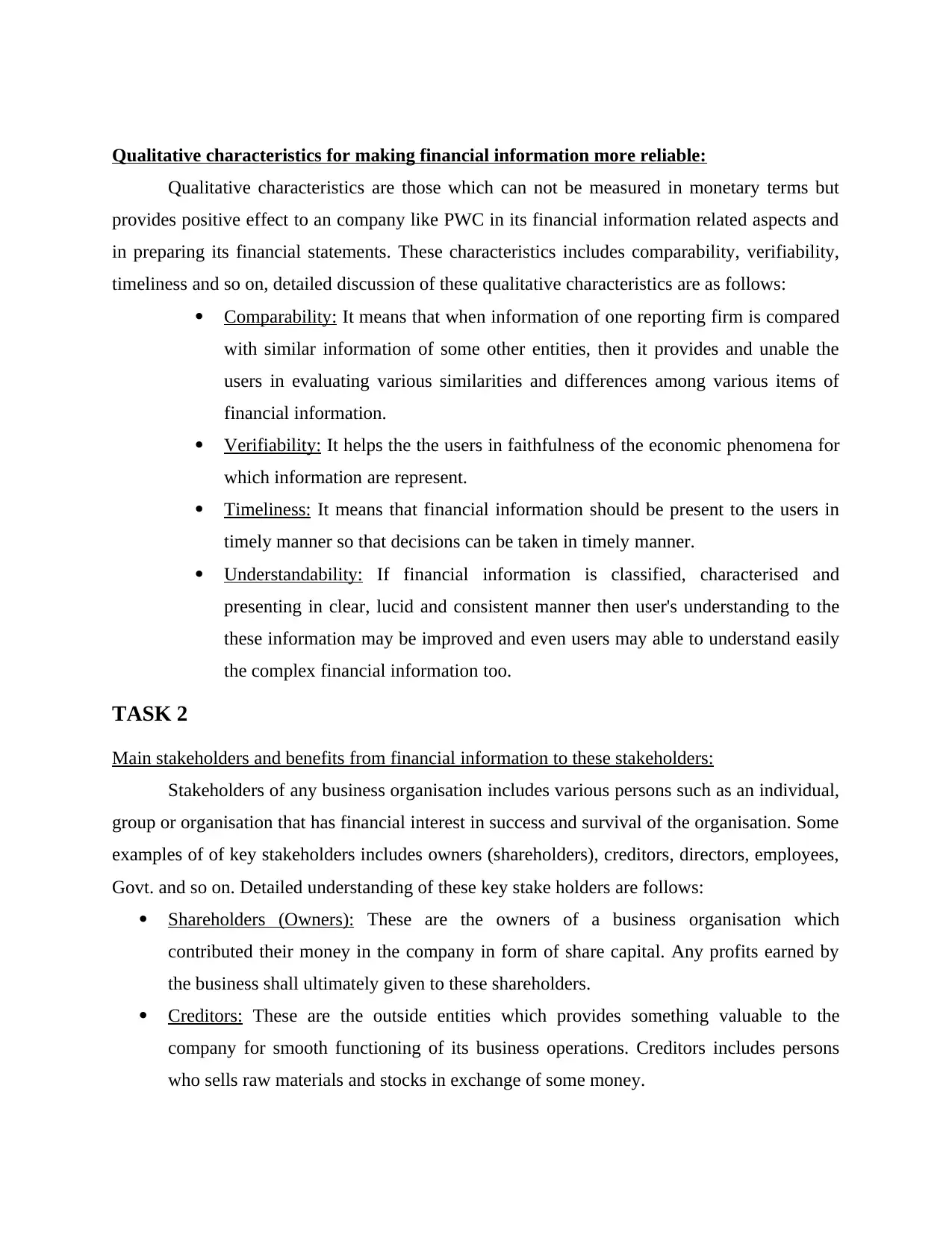
Qualitative characteristics for making financial information more reliable:
Qualitative characteristics are those which can not be measured in monetary terms but
provides positive effect to an company like PWC in its financial information related aspects and
in preparing its financial statements. These characteristics includes comparability, verifiability,
timeliness and so on, detailed discussion of these qualitative characteristics are as follows:
Comparability: It means that when information of one reporting firm is compared
with similar information of some other entities, then it provides and unable the
users in evaluating various similarities and differences among various items of
financial information.
Verifiability: It helps the the users in faithfulness of the economic phenomena for
which information are represent.
Timeliness: It means that financial information should be present to the users in
timely manner so that decisions can be taken in timely manner.
Understandability: If financial information is classified, characterised and
presenting in clear, lucid and consistent manner then user's understanding to the
these information may be improved and even users may able to understand easily
the complex financial information too.
TASK 2
Main stakeholders and benefits from financial information to these stakeholders:
Stakeholders of any business organisation includes various persons such as an individual,
group or organisation that has financial interest in success and survival of the organisation. Some
examples of of key stakeholders includes owners (shareholders), creditors, directors, employees,
Govt. and so on. Detailed understanding of these key stake holders are follows:
Shareholders (Owners): These are the owners of a business organisation which
contributed their money in the company in form of share capital. Any profits earned by
the business shall ultimately given to these shareholders.
Creditors: These are the outside entities which provides something valuable to the
company for smooth functioning of its business operations. Creditors includes persons
who sells raw materials and stocks in exchange of some money.
Qualitative characteristics are those which can not be measured in monetary terms but
provides positive effect to an company like PWC in its financial information related aspects and
in preparing its financial statements. These characteristics includes comparability, verifiability,
timeliness and so on, detailed discussion of these qualitative characteristics are as follows:
Comparability: It means that when information of one reporting firm is compared
with similar information of some other entities, then it provides and unable the
users in evaluating various similarities and differences among various items of
financial information.
Verifiability: It helps the the users in faithfulness of the economic phenomena for
which information are represent.
Timeliness: It means that financial information should be present to the users in
timely manner so that decisions can be taken in timely manner.
Understandability: If financial information is classified, characterised and
presenting in clear, lucid and consistent manner then user's understanding to the
these information may be improved and even users may able to understand easily
the complex financial information too.
TASK 2
Main stakeholders and benefits from financial information to these stakeholders:
Stakeholders of any business organisation includes various persons such as an individual,
group or organisation that has financial interest in success and survival of the organisation. Some
examples of of key stakeholders includes owners (shareholders), creditors, directors, employees,
Govt. and so on. Detailed understanding of these key stake holders are follows:
Shareholders (Owners): These are the owners of a business organisation which
contributed their money in the company in form of share capital. Any profits earned by
the business shall ultimately given to these shareholders.
Creditors: These are the outside entities which provides something valuable to the
company for smooth functioning of its business operations. Creditors includes persons
who sells raw materials and stocks in exchange of some money.
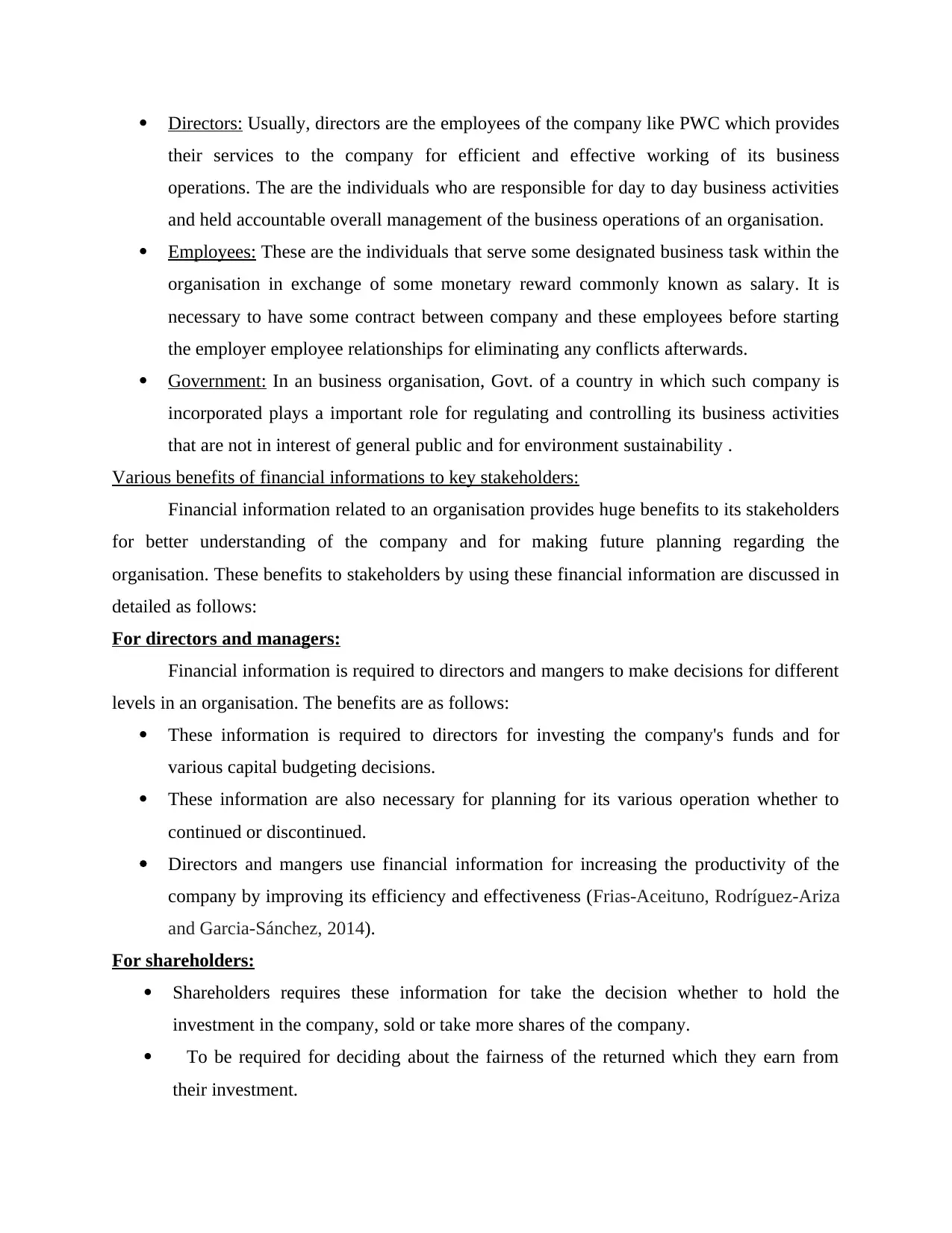
Directors: Usually, directors are the employees of the company like PWC which provides
their services to the company for efficient and effective working of its business
operations. The are the individuals who are responsible for day to day business activities
and held accountable overall management of the business operations of an organisation.
Employees: These are the individuals that serve some designated business task within the
organisation in exchange of some monetary reward commonly known as salary. It is
necessary to have some contract between company and these employees before starting
the employer employee relationships for eliminating any conflicts afterwards.
Government: In an business organisation, Govt. of a country in which such company is
incorporated plays a important role for regulating and controlling its business activities
that are not in interest of general public and for environment sustainability .
Various benefits of financial informations to key stakeholders:
Financial information related to an organisation provides huge benefits to its stakeholders
for better understanding of the company and for making future planning regarding the
organisation. These benefits to stakeholders by using these financial information are discussed in
detailed as follows:
For directors and managers:
Financial information is required to directors and mangers to make decisions for different
levels in an organisation. The benefits are as follows:
These information is required to directors for investing the company's funds and for
various capital budgeting decisions.
These information are also necessary for planning for its various operation whether to
continued or discontinued.
Directors and mangers use financial information for increasing the productivity of the
company by improving its efficiency and effectiveness (Frias‐Aceituno, Rodríguez‐Ariza
and Garcia‐Sánchez, 2014).
For shareholders:
Shareholders requires these information for take the decision whether to hold the
investment in the company, sold or take more shares of the company.
To be required for deciding about the fairness of the returned which they earn from
their investment.
their services to the company for efficient and effective working of its business
operations. The are the individuals who are responsible for day to day business activities
and held accountable overall management of the business operations of an organisation.
Employees: These are the individuals that serve some designated business task within the
organisation in exchange of some monetary reward commonly known as salary. It is
necessary to have some contract between company and these employees before starting
the employer employee relationships for eliminating any conflicts afterwards.
Government: In an business organisation, Govt. of a country in which such company is
incorporated plays a important role for regulating and controlling its business activities
that are not in interest of general public and for environment sustainability .
Various benefits of financial informations to key stakeholders:
Financial information related to an organisation provides huge benefits to its stakeholders
for better understanding of the company and for making future planning regarding the
organisation. These benefits to stakeholders by using these financial information are discussed in
detailed as follows:
For directors and managers:
Financial information is required to directors and mangers to make decisions for different
levels in an organisation. The benefits are as follows:
These information is required to directors for investing the company's funds and for
various capital budgeting decisions.
These information are also necessary for planning for its various operation whether to
continued or discontinued.
Directors and mangers use financial information for increasing the productivity of the
company by improving its efficiency and effectiveness (Frias‐Aceituno, Rodríguez‐Ariza
and Garcia‐Sánchez, 2014).
For shareholders:
Shareholders requires these information for take the decision whether to hold the
investment in the company, sold or take more shares of the company.
To be required for deciding about the fairness of the returned which they earn from
their investment.
⊘ This is a preview!⊘
Do you want full access?
Subscribe today to unlock all pages.

Trusted by 1+ million students worldwide
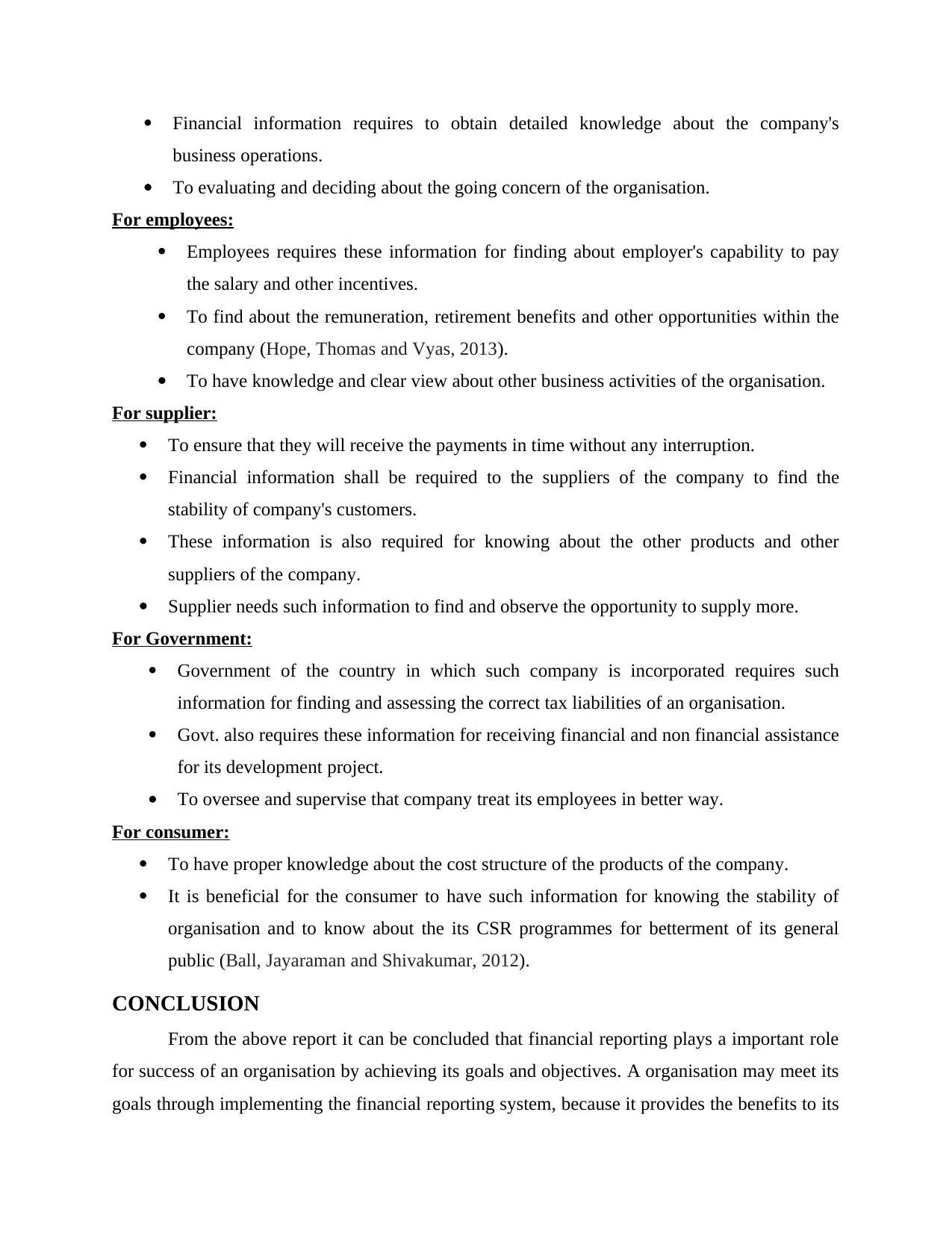
Financial information requires to obtain detailed knowledge about the company's
business operations.
To evaluating and deciding about the going concern of the organisation.
For employees:
Employees requires these information for finding about employer's capability to pay
the salary and other incentives.
To find about the remuneration, retirement benefits and other opportunities within the
company (Hope, Thomas and Vyas, 2013).
To have knowledge and clear view about other business activities of the organisation.
For supplier:
To ensure that they will receive the payments in time without any interruption.
Financial information shall be required to the suppliers of the company to find the
stability of company's customers.
These information is also required for knowing about the other products and other
suppliers of the company.
Supplier needs such information to find and observe the opportunity to supply more.
For Government:
Government of the country in which such company is incorporated requires such
information for finding and assessing the correct tax liabilities of an organisation.
Govt. also requires these information for receiving financial and non financial assistance
for its development project.
To oversee and supervise that company treat its employees in better way.
For consumer:
To have proper knowledge about the cost structure of the products of the company.
It is beneficial for the consumer to have such information for knowing the stability of
organisation and to know about the its CSR programmes for betterment of its general
public (Ball, Jayaraman and Shivakumar, 2012).
CONCLUSION
From the above report it can be concluded that financial reporting plays a important role
for success of an organisation by achieving its goals and objectives. A organisation may meet its
goals through implementing the financial reporting system, because it provides the benefits to its
business operations.
To evaluating and deciding about the going concern of the organisation.
For employees:
Employees requires these information for finding about employer's capability to pay
the salary and other incentives.
To find about the remuneration, retirement benefits and other opportunities within the
company (Hope, Thomas and Vyas, 2013).
To have knowledge and clear view about other business activities of the organisation.
For supplier:
To ensure that they will receive the payments in time without any interruption.
Financial information shall be required to the suppliers of the company to find the
stability of company's customers.
These information is also required for knowing about the other products and other
suppliers of the company.
Supplier needs such information to find and observe the opportunity to supply more.
For Government:
Government of the country in which such company is incorporated requires such
information for finding and assessing the correct tax liabilities of an organisation.
Govt. also requires these information for receiving financial and non financial assistance
for its development project.
To oversee and supervise that company treat its employees in better way.
For consumer:
To have proper knowledge about the cost structure of the products of the company.
It is beneficial for the consumer to have such information for knowing the stability of
organisation and to know about the its CSR programmes for betterment of its general
public (Ball, Jayaraman and Shivakumar, 2012).
CONCLUSION
From the above report it can be concluded that financial reporting plays a important role
for success of an organisation by achieving its goals and objectives. A organisation may meet its
goals through implementing the financial reporting system, because it provides the benefits to its
Paraphrase This Document
Need a fresh take? Get an instant paraphrase of this document with our AI Paraphraser

stakeholders and it has some qualitative characteristics which helps the company in achieving
such things. It is so because financial reporting assist the company to comply various statues and
regulatory requirements and also it facilitates statutory audit.
such things. It is so because financial reporting assist the company to comply various statues and
regulatory requirements and also it facilitates statutory audit.
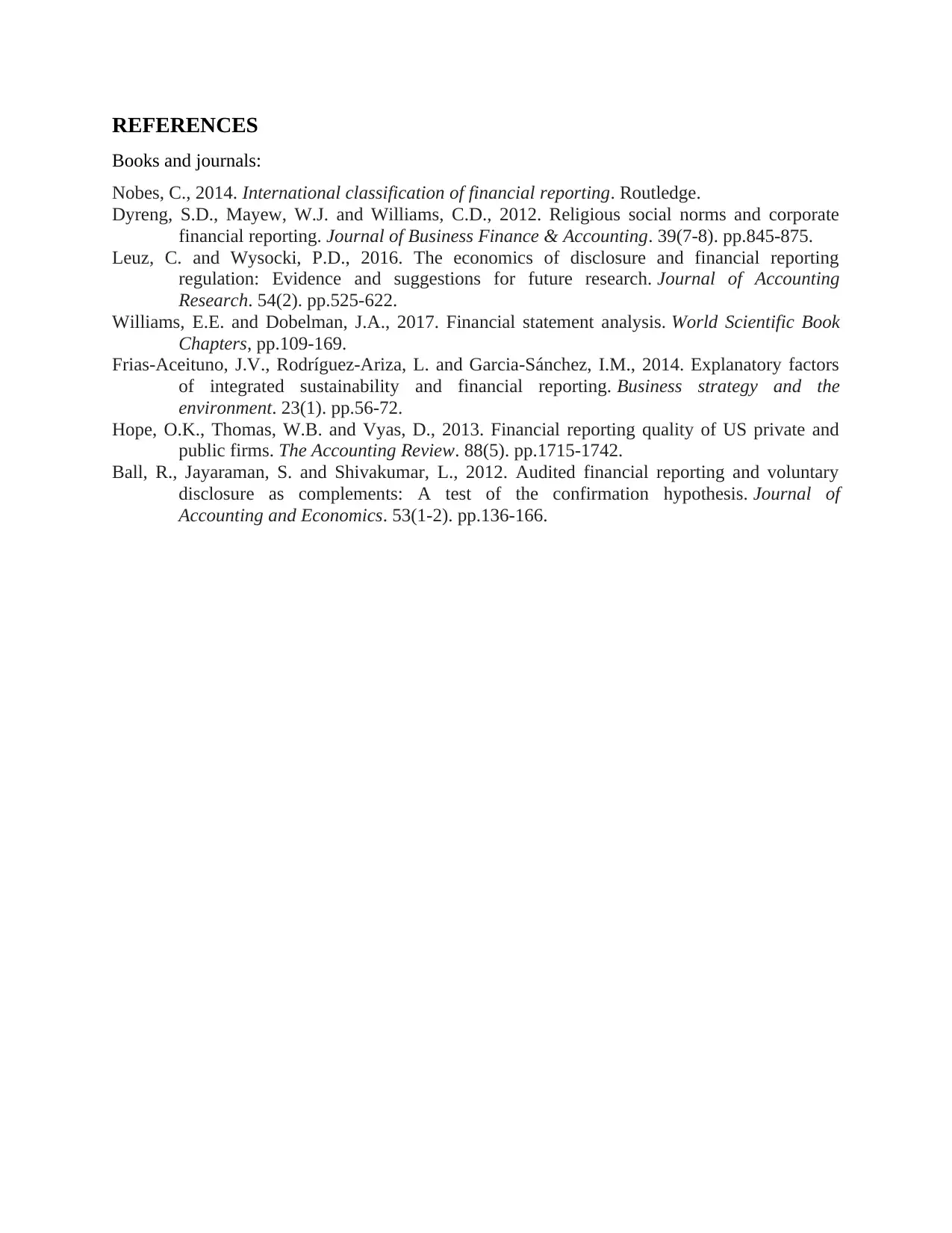
REFERENCES
Books and journals:
Nobes, C., 2014. International classification of financial reporting. Routledge.
Dyreng, S.D., Mayew, W.J. and Williams, C.D., 2012. Religious social norms and corporate
financial reporting. Journal of Business Finance & Accounting. 39(7‐8). pp.845-875.
Leuz, C. and Wysocki, P.D., 2016. The economics of disclosure and financial reporting
regulation: Evidence and suggestions for future research. Journal of Accounting
Research. 54(2). pp.525-622.
Williams, E.E. and Dobelman, J.A., 2017. Financial statement analysis. World Scientific Book
Chapters, pp.109-169.
Frias‐Aceituno, J.V., Rodríguez‐Ariza, L. and Garcia‐Sánchez, I.M., 2014. Explanatory factors
of integrated sustainability and financial reporting. Business strategy and the
environment. 23(1). pp.56-72.
Hope, O.K., Thomas, W.B. and Vyas, D., 2013. Financial reporting quality of US private and
public firms. The Accounting Review. 88(5). pp.1715-1742.
Ball, R., Jayaraman, S. and Shivakumar, L., 2012. Audited financial reporting and voluntary
disclosure as complements: A test of the confirmation hypothesis. Journal of
Accounting and Economics. 53(1-2). pp.136-166.
Books and journals:
Nobes, C., 2014. International classification of financial reporting. Routledge.
Dyreng, S.D., Mayew, W.J. and Williams, C.D., 2012. Religious social norms and corporate
financial reporting. Journal of Business Finance & Accounting. 39(7‐8). pp.845-875.
Leuz, C. and Wysocki, P.D., 2016. The economics of disclosure and financial reporting
regulation: Evidence and suggestions for future research. Journal of Accounting
Research. 54(2). pp.525-622.
Williams, E.E. and Dobelman, J.A., 2017. Financial statement analysis. World Scientific Book
Chapters, pp.109-169.
Frias‐Aceituno, J.V., Rodríguez‐Ariza, L. and Garcia‐Sánchez, I.M., 2014. Explanatory factors
of integrated sustainability and financial reporting. Business strategy and the
environment. 23(1). pp.56-72.
Hope, O.K., Thomas, W.B. and Vyas, D., 2013. Financial reporting quality of US private and
public firms. The Accounting Review. 88(5). pp.1715-1742.
Ball, R., Jayaraman, S. and Shivakumar, L., 2012. Audited financial reporting and voluntary
disclosure as complements: A test of the confirmation hypothesis. Journal of
Accounting and Economics. 53(1-2). pp.136-166.
⊘ This is a preview!⊘
Do you want full access?
Subscribe today to unlock all pages.

Trusted by 1+ million students worldwide
1 out of 9
Related Documents
Your All-in-One AI-Powered Toolkit for Academic Success.
+13062052269
info@desklib.com
Available 24*7 on WhatsApp / Email
![[object Object]](/_next/static/media/star-bottom.7253800d.svg)
Unlock your academic potential
Copyright © 2020–2026 A2Z Services. All Rights Reserved. Developed and managed by ZUCOL.





